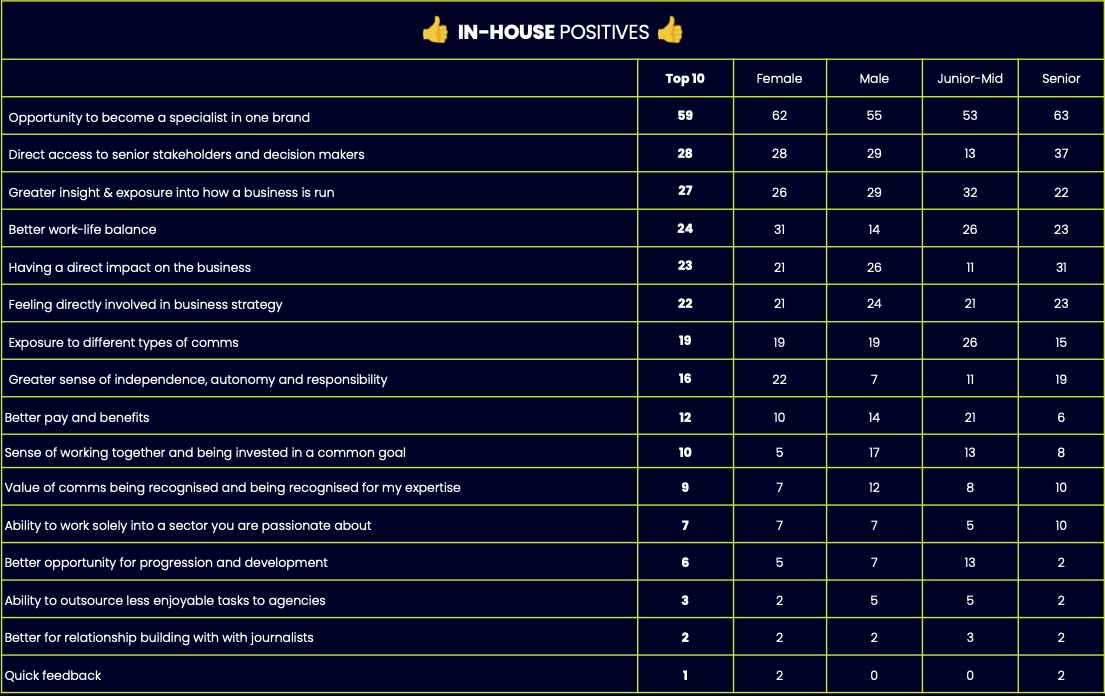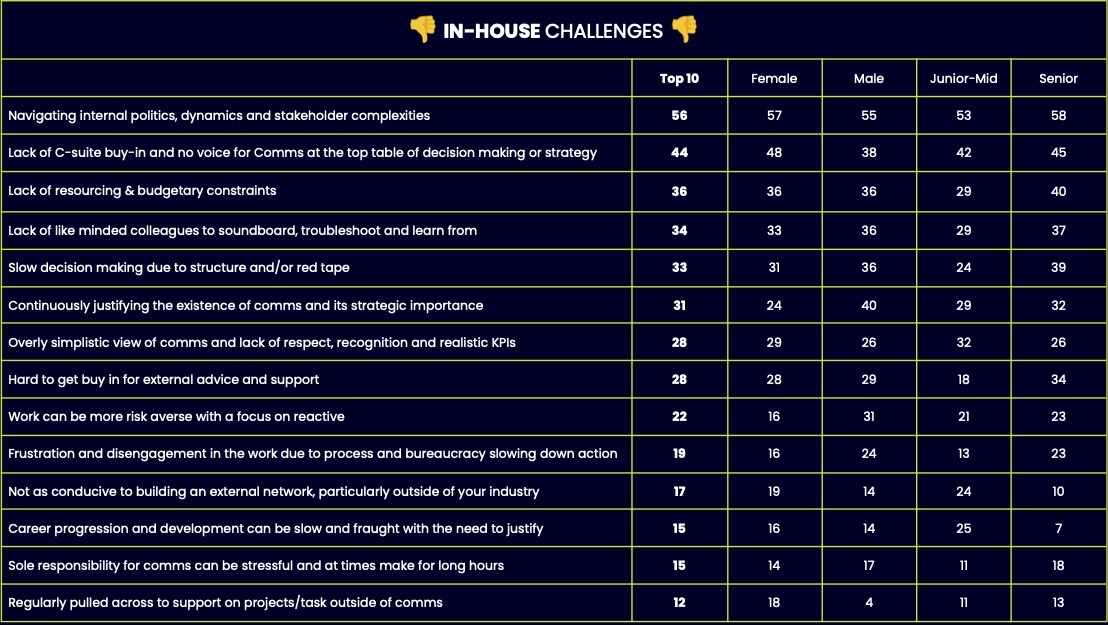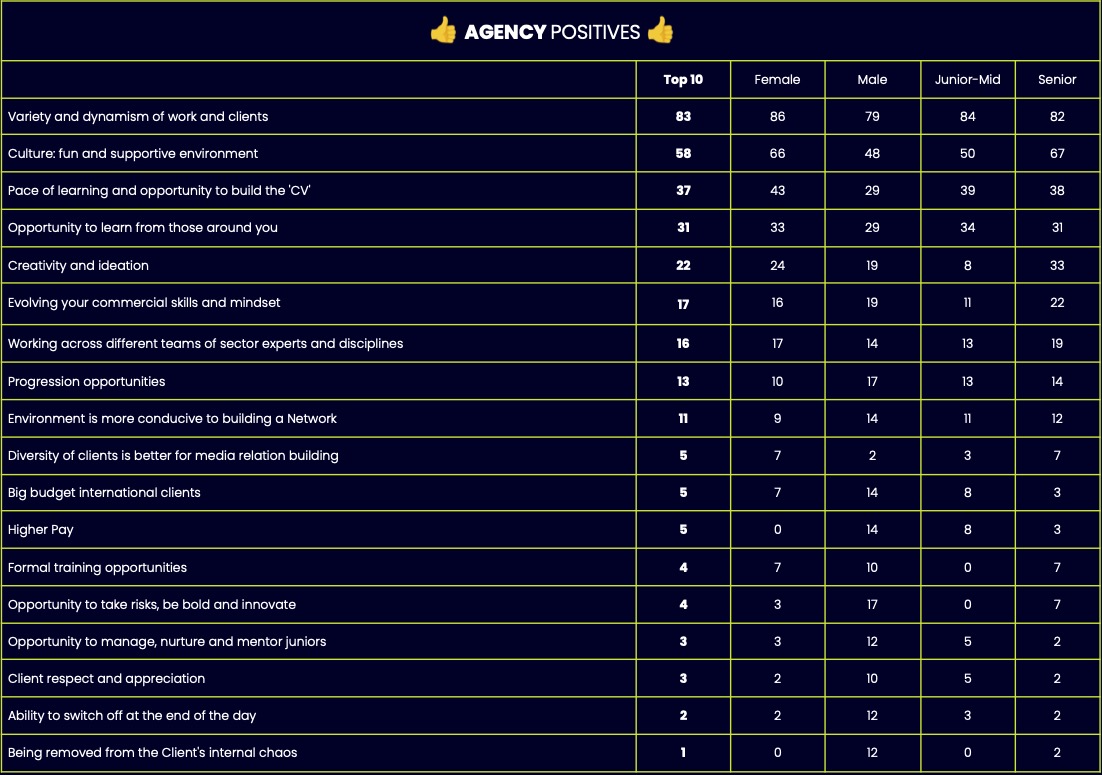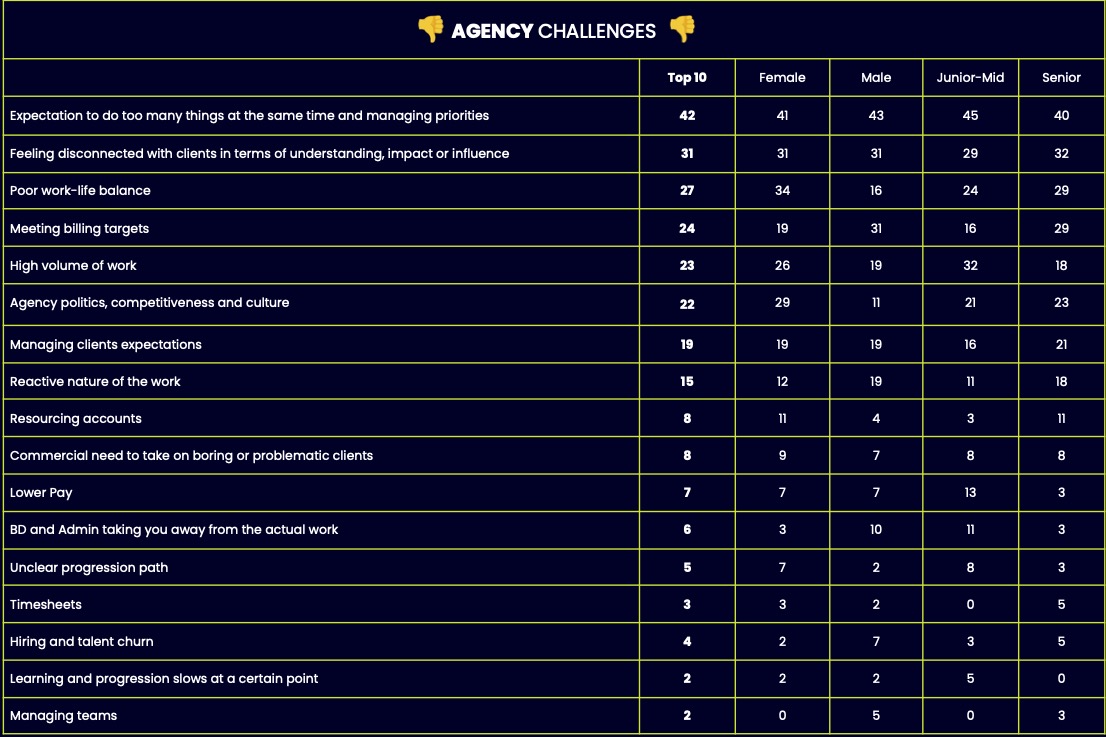
Germany – PR & Communications Salary Guide: 2025
We create our salary guides with the aim of them

As previously featured in PRWeek (In-House & Agency), we’ve penned a few further thoughts around the response to our Agency vs In-House survey.
It is no exaggeration to say that as recruiters we are asked about the merits of in-house versus agency and vice versa at least a half dozen times every single week.
The fact is also that most pose the question or come to the discussion with some form of preconceived notion about the merits of each, or more likely, the merits of one over the other. Regardless of experience, the debate rolls on as to which is best, or better.
It’s no secret that the generally accepted, and widely assumed, direction of travel in a comms career, is to end up in-house, irrespective of whether you started in agency or had a dalliance with it along the way. We get that, we understand that, and appreciate that it’s a well trodden path, however, that does seem to be changing somewhat.
From our vantage point, and in our experience, the problem most of the industry has with this quandary is that they seek to understand the balance of opinion and yet getting just that, a balanced opinion, is near impossible. Not to mention an opinion that is objective enough for you to be able to assess its relevance to you, personally.
Whether it be recency bias, familiarity or novelty bias, perhaps even recruiter bias, or just good old fashioned ‘the grass is always greener’ thinking, trying to ascertain which side of this ‘divide’ is objectively and unanimously ‘best’ is, for most, a fool’s errand.
We think it’s important to advise candidates and clients based on facts, not our own opinions and so, with that in mind, we set out to ask al broad spectrum of those in the industry with experience across both in-house and agency, not simply which they preferred or an arbitrary ‘which is better’, but rather their balanced opinion on the positives and challenges of both.
The goal of this was to pool those individual responses of the hive-mind and create a democratised list of the most common positives and challenges of agency and in-house. The hope being that you can take that data, those common observations, and plug it into your own personal situation or preferences to hopefully better inform on what would best fit you as an individual with your own knowledge of how you prefer to work and what you’re seeking from your career.
We’ve included the full data tables at the bottom of this article for those interested in a bit of a deeper dive, but below are some of the results and observations that stood out to us.
Some numbers
It may shock you to hear but the 126 respondents were overall 25% more vocal about the positives of agency and just over 30% more vocal about the challenges of in-house. Now, and let’s be clear, that particular data point doesn’t point to an outright win for agencies but if the old adage that unhappy people shout the loudest holds, then it’s not all sunshine and rainbows on the in-house side of the fence.
“In one word? Variety. In a sentence? The different companies and industries, breadth of exposure, and the opportunity to learn from high-quality colleagues, is unparalleled.”
Another result which surprised us was the largest difference in sentiment between demographics comparisons, in this case on the in-house side, was between mid-level respondents and senior level respondents. Which tells us that the experience you have in-house can very much depend on level whereas, seemingly level has far less bearing on agency experience.
Interestingly, the data also showed that senior respondents have more challenges in-house than in agency. The data suggests that whilst agency offers a more varied set of challenges, meaning more nuance as to how they apply to each individual, the higher volume of responses to a narrower set of challenges in-house, indicates the challenges are more ubiquitous across all.
On the other hand, some of the results didn’t surprise us, such as the number one positive cited for in-house being the ’Opportunity to become a specialist in one brand’ as it has always been a clear maxim that whilst agency provides the opportunity to gain broad exposure to several or many industries or businesses, in-house offers an opportunity for gaining tremendous depth into that specific business and perhaps the broader industry it is a part of.
“Being closer to the beating heart of a business, you can really build up a depth of expertise in that specific brand’s business and story, and therefore PR outcomes can be, at times, much more gratifying.”
Also as we’d have expected, ‘Better work life balance’ being cited as the 3rd most mentioned positive of in-house, with women supporting that view more than twice as often as men. This view was also corroborated in that twice as many women cited ‘Poor work-life balance’ as a challenge of agency life compared to men.
One fairly pervasive understanding we consistently encounter when talking to candidates about in-house vs agency is the assumption that in-house pays better. However, given the gusto and conviction with which that is believed in the market, the data isn’t overly compelling so as to support it. ‘Better pay and benefits’ squeezed into the top 10 with only 12% on average citing it as a positive of in-house. Furthermore, it would appear that the better pay is more keenly felt at the lower levels with only 1 in 20 senior respondents citing it as positive compared to 1 in 5 at the mid-level.
Finally, one of the numbers that really stood out to us was 83. On average 83% of respondents cited ‘Variety and dynamism of work and clients’ as a positive of Agency. Clearly the old ‘spice of life’ remains compelling for the majority.
“Agencies hire for what you can do. In-House hire for what you have done.”
What’s the take away(s)?
From our point of view, the results have thrown up some interesting takeaways, which we believe are valuable to both our candidate community and client partners alike.
Overall we believe the data has shown that seeking to compare Agency land and the In-House world through the same lens, or on the basis of the same metrics is problematic. The very debate we talked about at the start being focused on one versus the other is a false narrative. The truth is that each opportunity, each business and each role will have its own positives and challenges which may impact you differently at different stages of your career and or life.
Whether you’re a candidate keen to discuss the findings and how they might apply for you, or a client looking to better understand how to utilise these findings from an EVP point of view, do get in touch.




If you’d like to be kept in the loop of further data-driven content we have in the works, sign up to be the first in the know in the top right hand corner.

We create our salary guides with the aim of them

We create our salary guides with the aim of them

We always relish the chance to evolve our thinking on Talent best practice and embrace innovation, and so we were front and centre at the Slush stages to listen to contemporary thinking and wisdom from Talent leaders across the Tech and VC market.